- Home
- Jan-Philipp Sendker
Dragon Games
Dragon Games Read online
This is a work of fiction. Names, characters places and incidents either are the product of the author’s imagination or are used fictitiously, and any resemblance to actual persons, living or dead, events, or locales is entirely coincidental.
First published in Great Britain in 2016 by
Polygon, an imprint of Birlinn Ltd
West Newington House
10 Newington Road
Edinburgh
EH9 1QS
www.polygonbooks.co.uk
Copyright © 2007 by Karl Blessing Verlag
English language translation copyright © 2016 by Christine Lo
The right of Jan-Philipp Sendker to be identified as the author of this work has been asserted by him in accordance with the Copyright, Designs and Patents Act 1988. All rights reserved.
ISBN 978 1 84697 354 3
eBook ISBN 978 0 85790 330 3
British Library Cataloguing-in-Publication Data
A catalogue record for this book is available on request from the British Library
Typeset by 3btype.com
Printed and bound in Great Britain by Clays Ltd, St Ives plc
For Anna, Florentine, Theresa and Jonathan
CONTENTS
Prologue
Chapter One
Chapter Two
Chapter Three
Chapter Four
Chapter Five
Chapter Six
Chapter Seven
Chapter Eight
Chapter Nine
Chapter Ten
Chapter Eleven
Chapter Twelve
Chapter Thirteen
Chapter Fourteen
Chapter Fifteen
Chapter Sixteen
Chapter Seventeen
Chapter Eighteen
Chapter Nineteen
Chapter Twenty
Chapter Twenty-One
Chapter Twenty-Two
Chapter Twenty-Three
Chapter Twenty-Four
Acknowledgements
About the Author
By the Same Author
About the Translator
PROLOGUE
I’ve ended up in hell. Not of my own making. Not my fault. I must have lost my way. There’s no other explanation. At some point in the maze of life, I took the wrong turn without noticing. Wasn’t paying attention, for once. Took the left instead of the right fork. Or the other way around. I saw no sign, nothing that could have been a warning to me. I simply walked on without stopping. Just like I’ve always done in my life. Onward. Always onward.
I am not alone here. Hell is a crowded place. That is not a comfort.
Life is falling away from me; with every breath there is less of it. Like an old ruin being cleared away. Stone by stone. Every day there is another piece missing.
My body has become a cave. It is dark inside, so dark that not a single ray of light reaches me. And cold. And damp. I am cold at night and cold in the daytime.
The world outside has been extinguished before my eyes. The colors disappeared first, from the house, the fields, the village. A life in black and white. Everything looked like it did in the old films that we used to love watching. Then the shapes went; everything went blurry around me; I was looking at the world through a wall of water. Soon after that the darkness fell.
I cannot taste anything.
I cannot smell anything.
Nothing is left of the order and the beauty that once surrounded me. Apart from you and the music. You keep me alive. I hear and see you all day. Your tender hands with the long slim fingers. Your laughing eyes. Your lips. The way you sit bent low over a bowl of rice. Without you I would not be able to bear the pain any longer.
Musical scores also appear in the dark before my eyes. I see them quite clearly: five thin inky black lines on a blossom-white piece of paper. Small black dots with strokes. Like tadpoles in a pond. Allegro. Moderato. Adagio. I listen to every note, the high and the low, the slow and the fast. I hear the little hammers striking the strings. I hear the lightest touch of the bow on the violin. Fugues, études, sonatas. I hear orchestras. The violinists, the wind section, the percussion section. I hear entire operas. Mimi, Alfredo, Figaro and the Queen of the Night are my loyal companions. I came to them late, so have never been able to get enough. The greed of the hungry. Forgive me. I have music in my head. It eases the pain. It chases away dark thoughts, like the wind hustles the clouds along in front of it on a fall day.
CAN YOU HEAR ME, DARLING?
Oh yes. I can’t move. I can’t reach my hand out to you whenever I want to; I can’t turn my head toward you; I can’t thank you, but I can hear you. Every step. Every sigh. Every sound. Every breath. When you do the dishes. Sweep the floor. Push a chair back. Empty the pan of my excrement into the toilet. When you lie next to me and give me some of your warmth. When I feel less cold. Like before. Those are the moments in which even a life like this one is worth living.
You ask me if I can hear you?
There is nothing I wish for more than to be able to answer you. But I can’t. I am trapped in this useless body. I want to pound my fists against the walls with all my might; I could scream as loudly as I wanted – no one would hear me down here. I . . . looooove . . . yoooou. Not so long ago I tried one more time to make the shapes with my lips, to put my tongue against the roof of my mouth, place it behind my teeth and push the air out. Just three words. Only three. You did not understand them. You brought your ear right up against my mouth and asked me to repeat what I had said. Shhhhhhh . . . shhhhhhh . . . shhhhhhh. I couldn’t get any further than that, no matter how often I tried. I had become a shhhhhhh. Just for a few hours. Then the silence finally captured me and led me away. All that is left is the gurgling, the rattling breaths and the grunting that I now produce. What agony for me, when I love the human voice so.
Now my tongue lies useless in my mouth like a rotting old dumpling. My lips are dumb. But I feel your warm breath on my cheek when you carefully kiss me goodnight. The unmistakable breath of my darling old husband. The breath of the life we have lived.
Though I have been in darkness for so long now, it is the nights that are the worst. It is the silence around me that I find difficult. The house and the village are suddenly silent. Now and then I hear a lorry passing in the distance. A dog barks every so often. In the hours after midnight it is only the drawing of breath that binds me to the rest of the world.
They tell you that I am only an empty shell. A crumpled old doll with no soul. They let themselves be deceived by the way things look from the outside. As so often happens. As so many do. They wear uniforms, white coats; I know that, even though I can’t see them. I can tell by their voices. The voices of people who wear uniforms, no matter what color they are, always sound the same. They know. They are sure. All the tests prove it. There is no hope. I do not hear any uncertainty in their voices. There is no hope. No hope. That is only possible in the realm of the dead, which is closed to us. Ah, all the things in our lives that we have to hear from men and women in uniform. Don’t believe a word they say. They know nothing. They have no music in their heads.
No one must pity me. I don’t want tears on my bed. I don’t want to complain. Not as long as you are with me. When I think about it properly, I am really only in the forecourt of hell. Hell for the living is reserved for lonely people. I am not one of them.
Not as long as I feel your breath at night.
ONE
You are someone who is hungry for love. This was the first time that a woman had said this to him. He did not know whether it was criticism or a compliment. Aren’t we all? he replied, without giving it great thought.
She smiled. Some are more so than others.
What about me? More or less?
<
br /> More. More, more, more.
He took her in his arms. The delicate body that he was sometimes afraid he would crush. That could fill him with desire and render him helpless through long, sleepless nights like no one else in his life had done. He took a deep breath and closed his eyes.
More. More, more, more.
Hungry for love. There had been people in his life who would have meant to hurt him with these words. And there had been times when they would have succeeded. He would have taken the words as an insult, and rejected them as an outrageous accusation.
Not today. Although the words hunger and love did not fit together in his head. For him, at least with Christine in his arms, love was abundance, happiness and fulfillment. Hunger, on the other hand, was a need. Hunger had to be satisfied, at any price if necessary. Hunger knew only oneself, love only the other. People who were hungry were weak, but people who loved were strong. If hunger and love had anything in common, it was that they were both immeasurable.
He asked her what she had meant by it. If he should take her words as a complaint or a compliment.
Neither one nor the other, she said. It’s just something I’ve realized.
They left it at that.
Maybe, he thought, she was right. Perhaps the previous three years had left deeper traces than he was aware of. Three years in which he had wished for nothing more than to be alone. Three years in which a day when he had not exchanged a word with a single person had been a good day. A period in which his world had shrunk to the size of one house and a small, barely inhabited island with no cars, in the South China Sea. Maybe a person who had had to withdraw himself so much, who had lived in the past and on memories, who had loved nothing and no one on this earth more than someone dead, was a person who was in more trouble than Paul wanted to accept.
Hungry for love. It was the neediness in the description that he did not like, although he could not say exactly why. We are all needy, he wanted to say out loud, but he knew what Christine would say.
Some are more so than others.
What about me?
More. More, more, more.
He said nothing and kissed her on the forehead. He trailed his long fingers up her neck and massaged her head with gentle rhythmic motions. She closed her eyes and he stroked her face and her mouth. He could feel that his touch was arousing her; he heard her breath quickening. Not a lot, but enough to show him that they would not stop. He kissed her on the throat and she whispered that she wanted to make love to him. Here, on the terrace.
He heard the hum of the cicadas, the loud chirping of the birds, and, from a distance, the neighbors’ voices, and wanted to say that someone might see them, shouldn’t they go up to his bedroom instead? But she was kissing him so passionately and holding him so tight, showing him how much she desired him, here, now, that he said nothing.
She pulled one of the garden chairs over, pushed him down gently but firmly onto it, and straddled him.
She was wearing a skirt; she did not waste any time. She dictated the rhythm, and was more vigorous and abandoned in loving him than he had ever known her to be. At the end she let out a short cry, loud but not light and full of relief as usual. It was dark and deep, expelled with force, almost despairing. As though this was the last time.
They held each other tight for a long time, clinging to each other silently, listening to their breathing gradually returning to normal.
Before she got up, she took his head in her hands and looked him in the eyes. Did he know how much she loved him? What he meant to her? He nodded, a little surprised. Did he promise never to forget that?
He nodded again, too tired to ask any questions.
Later, when he brought her to the ferry, she was unnervingly quiet. It was a warm and humid tropical evening; they walked down the hill to Yung Shue Wan and the bushes around them were full of rustling, chirping and cheeping noises. He asked her what she was thinking.
Nothing in particular, she said.
Is everything okay?
She waved his question away.
They had to run the last few meters. Christine could not miss this ferry; she had promised her son and her mother to be home by dinnertime.
He hated rushing. The next ferry left in forty minutes and Paul found it an intolerable imposition to be forced by a timetable into hurrying. He was often to be found walking in measured steps toward the quay while other passengers rushed past him panting, responding to the ringing that announced that the gates were slowly closing, leaving him the only one who missed the boat. Instead of cursing, he sat down calmly on a bench under the shade of the pine trees in front of the bookshop and gazed at the sea. Or he crouched by the edge of the water and looked at the spray beneath him. Even as a child he had liked to watch the drops of water moving through the air; he had been fascinated by how they separated themselves from the sea, took shape for a couple of seconds, whizzing through the air, before disappearing almost immediately into the expanse of the ocean. People were like these little drops of water, he had thought then, they rose from and disappeared into the same infinity they came from. They stopped existing but still remained part of the whole. Somehow, this thought had been comforting to him as a ten-year-old. His father had liked it too, but he thought instead that people came to an end like drops of water falling on a hot plate. They disappeared into nothing with a quick hiss. The young Paul had found that comparison anything but comforting.
He loved looking at the waves, they way they played with the fishing boats and lapped the rocks in front of him. He heard the voice of the sea. Sometimes he even missed the next ferry while he daydreamed away like this.
But you don’t have a son waiting for you, Christine said when he had told her about this before.
No, he did not. His son was dead.
She had apologized immediately. She had only meant to say that he did not have any family or professional obligations: no boss, no business partner insisting on punctuality, no one waiting for him apart from her. And, if there were any doubt about it, she would forgive him if he were late.
Christine said a hurried goodbye with a quick kiss. He watched her walk up the gangway without turning back to look at him, and she disappeared into the belly of the ship a few seconds later. He stood on the pier, waving in the darkness and watching the ferry until it disappeared around the tip of the island.
The sea was a deep black in front of him and the lights of Cheung Chau and Lantau twinkled in the distance. A junk full of day-trippers hove into view, close to Lamma. He could hear the monotonous thump of its diesel engine, children shrieking and parents admonishing them. The sound of voices and laughter floated over from the seaside promenade in Yung Shue Wan. He strolled along the pier, relishing the warm, humid air, soft as silk. At Green Cottage restaurant he got a table right by the water and ordered a freshly pressed apple, carrot, and ginger juice. He was the only lone diner. He missed Christine already, even though her ferry was only just arriving at Hong Kong harbor.
Four weeks ago he had sat at this very spot looking at the fishing boats bobbing up and down on the water, the red lanterns reflected in the water, and wondered if Christine should move in with him. Her son could take the ferry to school and she could take a slightly later ferry to work. There was enough space in the house. Square footage, at least, but would he be able to stand seeing another child in Justin’s room? The idea of it was as terrible as it was tempting. An attempt at having a family, aged fifty-three, after the first one had failed.
The thought of it had stayed with him since and he had wanted to talk about it with Christine today. But she had avoided his questions and had been very quiet all day, withdrawn. Hungry for love. What made her think that? He tried to remember how she had sounded when she said it. Tender, he thought at the time, now he began to doubt it.
She rang him every Sunday evening before she went to bed, to tell him she had arrived home safely, how much she had enjoyed the time with him, and that she missed him alread
y. And he said that he felt exactly the same way. It was their Sunday ritual and rituals had come to mean so much.
He paid attention to the little things now.
He had begun to pursue beauty into her hiding place. For the first time in his life.
The death of his son had been his teacher. A terrible, merciless teacher who had not forgiven any mistakes or tolerated any objections. Paul had learned one of the most important lessons in life from it: never to take anything for granted again.
He used to think that it was just a matter of course for babies to become children, children to grow into young people, and young people to become adults.
He had thought that bruises on a child’s body only came from a fall or a push.
He had thought that children who fell ill got better.
The fragility of happiness.
The randomness of unhappiness.
Nothing was a matter of course. Anyone who understood that, no, Paul thought, anyone who had experienced these banal words, so often said glibly, as an existential truth never, ever forgot it; he was an outsider forever, someone for whom home was an impossible concept. He could make plans, father children, buy houses, make decisions about the future, and know at the same time that he was submitting himself to an illusion, that the future was only a promise and that you could never rely on it, that security could never be permanent, but could only exist for short, infinitely precious moments.
Was all the happiness in this world not hanging from a thread stretched tight, to breaking point? It was so thin that most people did not even notice it.
I’m sorry to have to tell you. With these words, the doctor had snipped Paul’s thread. Forever and ever, as his son might have said. There was no going back. Paul had reconciled himself to this thought. Until he met Christine.
As if trusting was only for fools. As if we had a choice. Those were the first words she had said that he had remembered. He had not taken them seriously at first. He had been secretly a little amazed that a grown woman was so naïve. Until then he had been convinced that being skeptical was useful, that it protected us, and in sufficient measure kept us from great disappointment. He knew they came from two very different worlds: Christine Wu, the dreamer, and Paul Leibovitz, the realist.

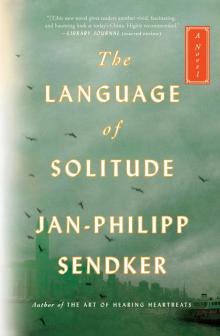 The Language of Solitude
The Language of Solitude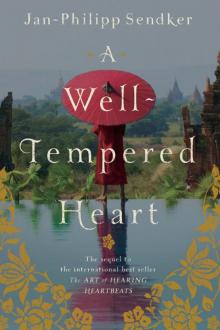 A Well-Tempered Heart
A Well-Tempered Heart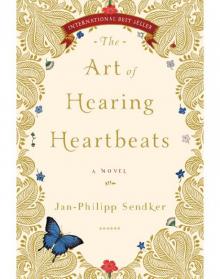 The Art of Hearing Heartbeats
The Art of Hearing Heartbeats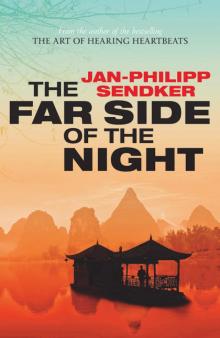 The Far Side of the Night
The Far Side of the Night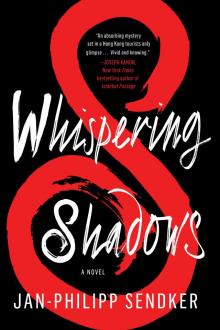 Whispering Shadows
Whispering Shadows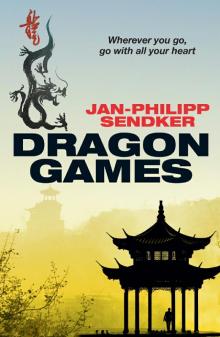 Dragon Games
Dragon Games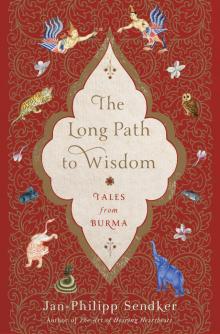 The Long Path to Wisdom
The Long Path to Wisdom